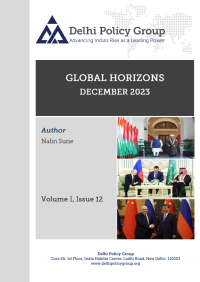Global Horizons
Date: January 04, 2024
The final month of 2023 saw the war in Ukraine increasingly stalemated, with Ukraine’s position getting undermined on account of both internal and external factors. The author suggests that post-winter, if both sides realise that neither is likely to achieve its objectives militarily, there may be resumption of dialogue and diplomacy. Irrespective, the security situation in Europe will remain unsettled, as the trust deficit between Russia and Europe has seriously deepened.
As it pursued its campaign against Hamas, Israel appeared unwilling to countenance restraint from any quarter, irrespective of the colossal humanitarian consequences and loss of Palestinian lives. This could hurt Israel in the long term.
Meanwhile, the bloodshed in the ongoing civil war in Sudan has gone unnoticed, and another humanitarian crisis is in the making.
COP28 hosted by the UAE in Dubai during the month saw some progress towards an orderly transition from fossil fuels to climate-neutral energy systems, as well as in some other areas.
President Putin visited Saudi Arabia and the UAE, and hosted his counterpart from Iran, with the respective relations being driven by mutual benefit. Russian PM Mishustin visited Beijing for discussions with his Chinese counterpart on enhancing bilateral trade, economic and investment partnerships. He was received by President Xi, who called for “jointly maintaining the security and stability of the industrial and supply chains.”
December also saw major conferences in China, on economic work and foreign relations, being led by President Xi. The messaging was that China will continue its aggressive drive externally, while essentially sticking to economic policies already in place. The question remains whether the right cards on economic revival will be compatible with Xi’s intention to maintain the iron control of the CPC.
President Xi also visited Vietnam, to underline China’s determination to further strengthen its periphery.
The 24th EU-China Summit was held in Beijing, with President Xi terming the EU as a key partner for economic and trade cooperation, preferred partner for S&T cooperation, and a trustworthy partner for industrial and supply chain cooperation. The EU Council President on his part underlined the EU’s intention to “promote our values and protect our interests”, and “to make the relationship fairer and more reciprocal.”
Japan marked the 50th year of ASEAN-Japan friendship and cooperation by hosting a commemorative summit in Tokyo, seeking to claw back influence in its critical neighbourhood.
India hosted important state visits by the President of Kenya and the Sultan of Oman, both longstanding partners with which India has broad-based arrangements, covering economic, defence and security cooperation.
Finally, India’s EAM, Dr. S. Jaishankar, visited Russia from December 25-29. Coming at a difficult juncture in international relations, the visit reaffirmed that India-Russia relations remained strong, based on strategic convergences, geopolitical interests and mutually beneficial cooperation.
The author concludes that in the coming year, the international community faces daunting challenges that must be handled sensibly and resolved. The need for deep rooted reform in the international system, based on equality and open dialogue, has never been greater.
To read this Global Horizons, Vol. I, Issue 12, please see the PDF attached.
As it pursued its campaign against Hamas, Israel appeared unwilling to countenance restraint from any quarter, irrespective of the colossal humanitarian consequences and loss of Palestinian lives. This could hurt Israel in the long term.
Meanwhile, the bloodshed in the ongoing civil war in Sudan has gone unnoticed, and another humanitarian crisis is in the making.
COP28 hosted by the UAE in Dubai during the month saw some progress towards an orderly transition from fossil fuels to climate-neutral energy systems, as well as in some other areas.
President Putin visited Saudi Arabia and the UAE, and hosted his counterpart from Iran, with the respective relations being driven by mutual benefit. Russian PM Mishustin visited Beijing for discussions with his Chinese counterpart on enhancing bilateral trade, economic and investment partnerships. He was received by President Xi, who called for “jointly maintaining the security and stability of the industrial and supply chains.”
December also saw major conferences in China, on economic work and foreign relations, being led by President Xi. The messaging was that China will continue its aggressive drive externally, while essentially sticking to economic policies already in place. The question remains whether the right cards on economic revival will be compatible with Xi’s intention to maintain the iron control of the CPC.
President Xi also visited Vietnam, to underline China’s determination to further strengthen its periphery.
The 24th EU-China Summit was held in Beijing, with President Xi terming the EU as a key partner for economic and trade cooperation, preferred partner for S&T cooperation, and a trustworthy partner for industrial and supply chain cooperation. The EU Council President on his part underlined the EU’s intention to “promote our values and protect our interests”, and “to make the relationship fairer and more reciprocal.”
Japan marked the 50th year of ASEAN-Japan friendship and cooperation by hosting a commemorative summit in Tokyo, seeking to claw back influence in its critical neighbourhood.
India hosted important state visits by the President of Kenya and the Sultan of Oman, both longstanding partners with which India has broad-based arrangements, covering economic, defence and security cooperation.
Finally, India’s EAM, Dr. S. Jaishankar, visited Russia from December 25-29. Coming at a difficult juncture in international relations, the visit reaffirmed that India-Russia relations remained strong, based on strategic convergences, geopolitical interests and mutually beneficial cooperation.
The author concludes that in the coming year, the international community faces daunting challenges that must be handled sensibly and resolved. The need for deep rooted reform in the international system, based on equality and open dialogue, has never been greater.
To read this Global Horizons, Vol. I, Issue 12, please see the PDF attached.



